
Mankombu Sambasivan Swaminathan is an Indian geneticist and administrator, known for his role in India's Green Revolution. Swaminathan has been called the "Father of Green Revolution in India" for his role in introducing and further developing high-yielding varieties of wheat in India. He is the founder of the MS Swaminathan Research Foundation.
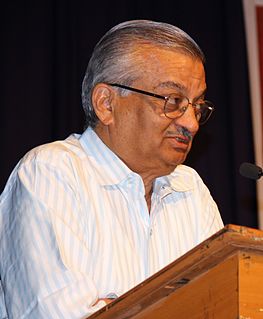
Anil Kakodkar is an Indian nuclear physicist and mechanical engineer. He was the chairman of the Atomic Energy Commission of India and the Secretary to the Government of India, he was the Director of the Bhabha Atomic Research Centre, Trombay from 1996–2000. He was awarded the Padma Vibhushan, India's second highest civilian honour, on 26 January 2009.
Thomas Kailath is an electrical engineer, information theorist, control engineer, entrepreneur and the Hitachi America Professor of Engineering, Emeritus, at Stanford University. Professor Kailath has authored several books, including the well-known book Linear Systems, which ranks as one of the most referenced books in the field of linear systems.

Mylswamy Annadurai, popularly known as Moon Man of India, is an Indian scientist working as vice president for Tamil Nadu State Council for Science and Technology (TNSCST), Chairman, Board of Governors, National Design and Research Forum(NDRF. He was born on 2 July 1958, in a village called Kothavadi near Pollachi in Coimbatore district, Tamil Nadu state of India). Prior to taking this assignment he was with Indian Space Research Organisation and served as director, ISRO Satellite Centre (ISAC), Bangalore. During his 36 years of service in ISRO, he had some of the major contributions, including two of the major missions of ISRO, namely Chandrayaan-1 and Mangalyaan. Annadurai has been listed among 100 Global thinkers of 2014 and topped the innovators list. His works are mentioned in textbooks of Tamil Nadu Board of Secondary Education

Madhav Dhananjaya Gadgil is an Indian ecologist, academic, writer, columnist and the founder of the Centre for Ecological Sciences, a research forum under the aegis of the Indian Institute of Science. He is a former member of the Scientific Advisory Council to the Prime Minister of India and the Head of the Western Ghats Ecology Expert Panel (WGEEP) of 2010, popularly known as the Gadgil Commission. He is a recipient of the Volvo Environment Prize and the Tyler Prize for Environmental Achievement. The Government of India awarded him the fourth highest civilian award of the Padma Shri in 1981 and followed it up with the third highest award of the Padma Bhushan in 2006.
Baldev Raj was an Indian scientist and director of the Indira Gandhi Centre for Atomic Research (IGCAR) in Kalpakkam, India.
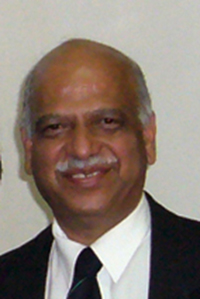
Shridhar Ramachandra Gadre is an Indian scientist working in computational quantum and theoretical chemistry.
Shivram Baburao Bhoje is a distinguished Indian nuclear scientist who worked in the field of fast-breeder nuclear reactor technology for forty years in the design, construction, operation, and research and development. Indian government has honoured him with Padma Shri in 2003, the fourth highest civilian award in India, for his distinguished service to science and engineering fields.
Krishna N. Ganesh is an Indian chemist. Currently, he is the director of Indian Institute of Science Education and Research, Tirupati. He was previously the director of the Indian Institute of Science Education and Research, Pune.
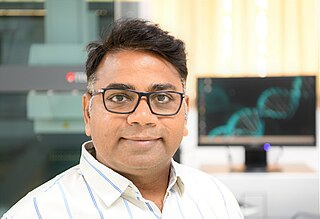
Rajeev Kumar Varshney is an agricultural scientist, specializing in genomics, genetics, molecular breeding and capacity building in developing countries. Varsheny is currently the Research Program Director- Genetic Gains that includes several units viz. Genomics & Trait Discovery, Forward Breeding, Pre-Breeding, Cell, Molecular Biology & Genetic Engineering, Seed Systems, Biotechnology- ESA, Sequencing and Informatics Services Unit, and Genebank ; and Director, Center of Excellence in Genomics & Systems Biology at the International Crops Research Institute for the Semi-Arid Tropics (ICRISAT), a global agricultural research institute. He holds Adjunct/Honorary/Visiting Professor positions at 10 academic institutions in Australia, China, Ghana, Hong Kong and India, including Murdoch University, The University of Western Australia, University of Queensland, West Africa Centre for Crop Improvement, University of Hyderabad, Chaudhary Charan Singh University and Professor Jayashankar Telangana State Agricultural University.

Dr. Krishnaswamy VijayRaghavan FRS is an emeritus professor and former director of the National Centre for Biological Sciences. On 26 March 2018 the Government of India appointed him as the principal scientific adviser to succeed Dr. R Chidamabaram. In 2012 he was elected a fellow of The Royal Society and in April 2014 he was elected as a foreign associate of the US National Academy of Sciences. He was conferred the Padma Shri on 26 January 2013 and is also a recipient of the Infosys Prize in the life sciences category in 2009.
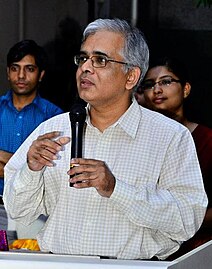
Shekhar C. Mande is a Structural and Computational Biologist. He did his M.Sc. in Physics from University of Nagpur. He holds Doctor of philosophy in Molecular Biophysics, from the Indian Institute of Science. Following his PhD, he joined Prof. Wim G. J. Hol as Post Doctoral Fellow at Rijksuniversiteit Groningen in the Netherlands. Since 2001, he was senior staff scientist at Centre for DNA Fingerprinting and Diagnostics. Between September 2011 and September 2018 He served as director at National Centre for Cell Science in Pune, India. Currently he serves as the Director General of the Council of Scientific and Industrial Research (CSIR)-cum- Secretary, Department of Scientific and Industrial Research (DSIR), Govt of India.
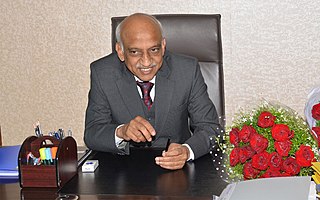
Aluru Seelin Kiran Kumar is an Indian space scientist and former chairman of the Indian Space Research Organisation, having assumed office on 14 January 2015. He is credited with the development of key scientific instruments aboard the Chandrayaan-1 and Mangalyaan space crafts. In 2014, he was awarded the Padma Shri, India's fourth highest civilian award, for his contributions to the fields of science and technology. Kiran Kumar previously served as Director of Ahmedabad Space Applications Centre.
Lila Firoz Poonawalla is an Indian industrialist, philanthropist, humanitarian and the founder of Lila Poonawalla Foundation, a non governmental organization promoting professional education among aspiring girls in India by providing scholarships and guidance. She is one of the pioneering Indian woman to secure a professional degree in Mechanical Engineering and is a former chairperson of Alfa Laval India and TetraPak India. She was awarded the fourth highest civilian award of Padma Shri by the Government of India in 1989 and the Order of the Polar Star by Carl XVI Gustaf, the King of Sweden, in 2003.
Satinder Kumar Sikka is an Indian nuclear condensed matter physicist, crystallographer and a former Scientific Secretary to the Principal Scientific Advisor of the Government of India. He is known to have played a crucial role, along with Raja Ramanna, Rajagopala Chidambaram and Basanti Dulal Nagchaudhuri, in the design and development of a Hydrogen Bomb by India, which was tested at the Pokhran Test Range in May 1998, under the code name, Operation Shakthi. He was also involved in the Smiling Buddha tests, conducted in 1974. He was awarded the fourth highest civilian award of the Padma Shri, by the Government of India, in 1999.
Dilip Devidas Bhawalkar is an Indian optical physicist and the founder director of the Raja Ramanna Centre for Advanced Technology (CAT), an institute under the Department of Atomic Energy, serving as a centre for higher studies in the fields of lasers and particle accelerators. He is credited with pioneering research in optics and lasers in India and is reported to have contributed in making CAT a partner in the International Linear Collider and Large Hadron Collider experiments of the European Organization for Nuclear Research (CERN). He is a recipient of the Shanti Swarup Bhatnagar Prize, the highest Indian award in science and technology. The Government of India awarded him the fourth highest civilian award of the Padma Shri in 2000.
Tumkur Seetharamaiah Prahlad is an Indian aerospace scientist and the former director of the National Aerospace Laboratories (NAL), Bengaluru, known as a specialist in Aerodynamics and Aerospace Design. His contributions are reported in Indian civil aircraft development programmes of Hansa and NAL Saras and light combat aircraft development programme. The Government of India awarded him the civilian honour of the Padma Shri in 2004, The same year, he received the H. K. Firodia Award from H. K. Firodia Memorial Foundation.
Sanjeev Dhurandhar is Professor at IUCAA, Pune. His research interest is detection and observation of Gravitational waves. Dhurandhar was part of the Indian team which contributed to the detection of gravitational waves. He is the science advisor to the IndIGO consortium council.

Naveen Garg is a Professor of Computer Science in Indian Institute of Technology Delhi, specializing in algorithms and complexity in theoretical computer science. He was awarded the Shanti Swarup Bhatnagar Prize for Science and Technology, India's highest prize for excellence in science, mathematics and technology, in the mathematical sciences category in the year 2016. Naveen Garg's contributions are primarily in the design and analysis of approximation algorithms for NP-hard combinatorial optimization problems arising in network design, scheduling, routing, facility location etc.